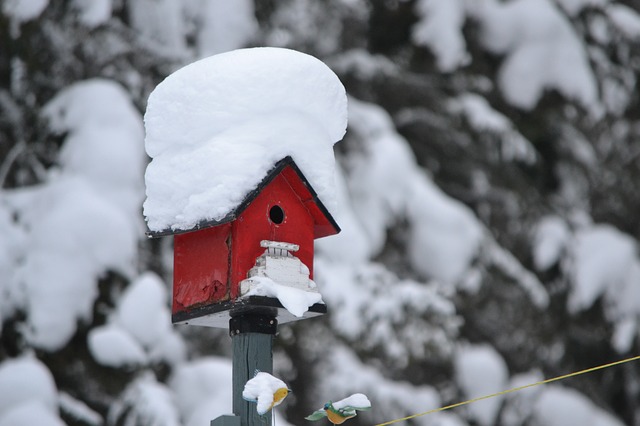Winter can be a wonderful season – snow falling, sledding and all the other popular winter activities – but it can also be dangerous. Temperatures fall below freezing, and this can present a number of issues for your home. Of course there’s the obvious shoveling, making sure your car doesn’t get stuck, and keeping your home toasty warm, but there are a few more issues that can present themselves during the chilly season, and they can be big. Below are 5 major dangers you and your home face during the winter, and tips to avoid them.
Carbon Monoxide Poisoning
This is a very real threat especially in the winter. As you heat your home and keep it closed up to conserve that heat, the risk for carbon monoxide poisoning goes up. Although this is certainly a very frightening danger, it is easily avoidable. Carbon monoxide detectors can be installed in your home for a reasonably low cost, and you can also make sure you have your heating system inspected to see if it’s running properly before you really need it for the winter.
Carbon monoxide poisoning is an alarming possibility, but it is also easily preventable. In addition to the above remember not to start your car with the garage door closed. Follow these tips to protect your home and family.
Roof Collapse
Michigan is no stranger to snow. From November to March we get all kinds of it, in large amounts and small. Unfortunately, if not taken care of, snow can do a lot of damage to your home, most especially to your roof. Too much snow buildup can lead to a roof collapse, which will literally leave you out in the cold.
How can you prevent it? Living in Michigan, your home builder probably took the probability of heavy snowfall into consideration while designing your roof, so for the most part, it should hold up well. If your roof is very old or in some sort of disrepair, however, you could be in danger for the upcoming season. If you get a very heavy snowfall and your roof seems to be bearing quite a bit of precipitation, you may consider removing some of it to help alleviate pressure. Alternatively, you can call a professional, as this is not always an easy task in the winter.
Freezing Pipes
Cold snaps and quickly freezing temperatures present a hazard to your water pipes. These sudden cold temperatures can freeze the water within your pipes, and if not taken care of immediately, the pipes can then burst, potentially causing thousands of dollars of damage, not to mention the following threat of mold.
How can you avoid this particular threat? Make sure your pipes are well insulated before winter hits. Check crawl spaces, attics, and pipes exposed to the exterior of your home, as these are the most likely to freeze. If any of these areas could do with more insulation, call a plumber to help you, or if that’s not an option, even a little bit of newspaper can make a big difference. After that, make sure to keep your home at a temperature somewhere over 55 degrees. If you’re really worried about the cold, you can leave your faucet dripping, as it’s difficult for a pipe to freeze if the water within it is running.
How will you know if your pipes have frozen? If you turn on the faucet and get little water, or none at all, this is a sure sign that your pipes have frozen. If you can’t get ahold of a plumber, you can attempt to thaw out the pipe yourself with a hair dryer or a small space heater. Do not use a blowtorch or anything of the like, as this is a fire hazard.
Fires
Everyone loves a roaring fireplace during the chilly winter months. It creates a warm, cozy atmosphere, but if you don’t monitor it properly it can cause serious damage to your home. To avoid these situations, make sure you only burn hardwoods like oak and maple, and never burn trash and paper products in your fireplace. It’s also a good idea to get your chimney swept once a year, so if you haven’t done that in a while, now’s a great time.
Heating units are another major perpetrator of winter house fires. Whether it be space heaters too close to curtains, or heating systems gone unchecked, make sure you’re conscious of where you’re placing space heaters, and get your central heating system inspected before the cold really hits.
Ice Dams
Your house has to deal with a lot of hazards during the winter. Ensure that ice dams aren’t one. Ice dams form when heat in your attic warms up the snow on your roof, which then slides down and freezes on your home’s eaves. As this freezes, it creates a backup that allows additional melted snow to enter into your home through the roof, potentially causing a lot of water damage.
How to avoid ice dams? The best way to avoid ice dams is to have a well insulated attic. Insulation will prevent heat from escaping out of your roof, which will stop ice dams from forming. Too late for that? Until you can get better insulation, you should try to keep your attic at a cooler temperature to prevent the snow from melting.
Winter is an unpredictable season, so make sure you’re covered for any accident. For more information regarding these topics, or if you have any other questions, call Doyle & Ogden at 616-949-9000 to speak with one of our knowledgeable insurance agents or visit our website today for a free insurance quote!

